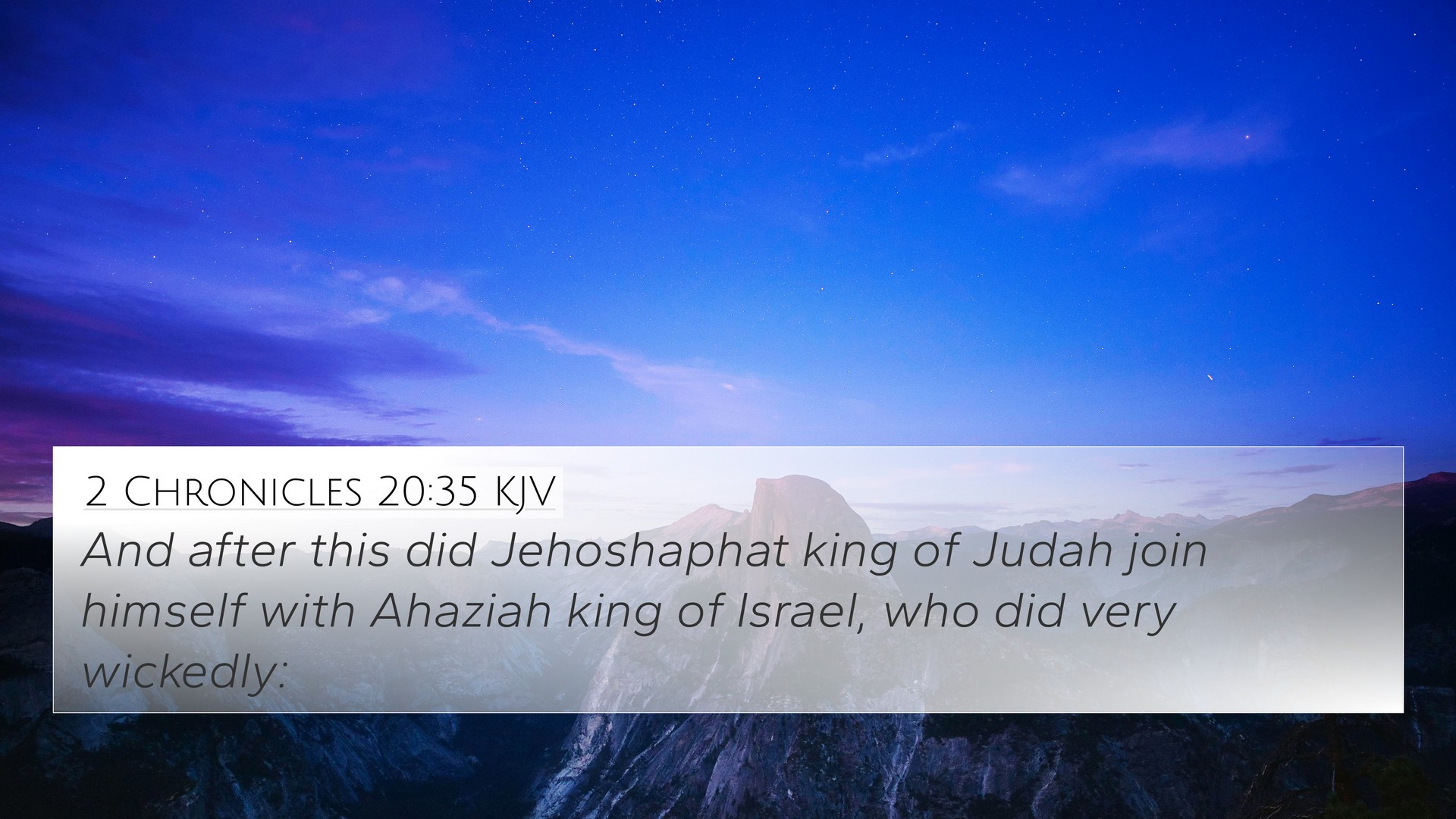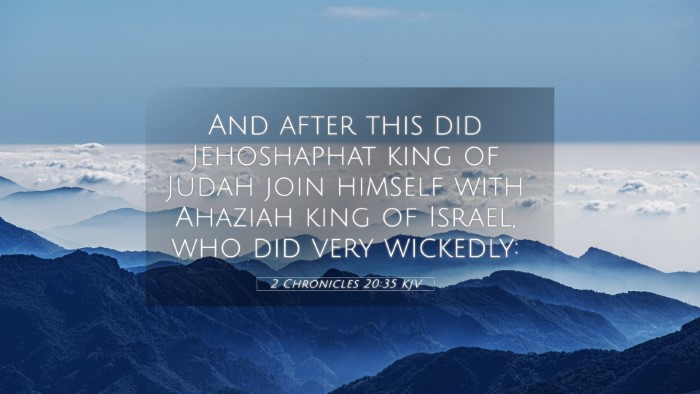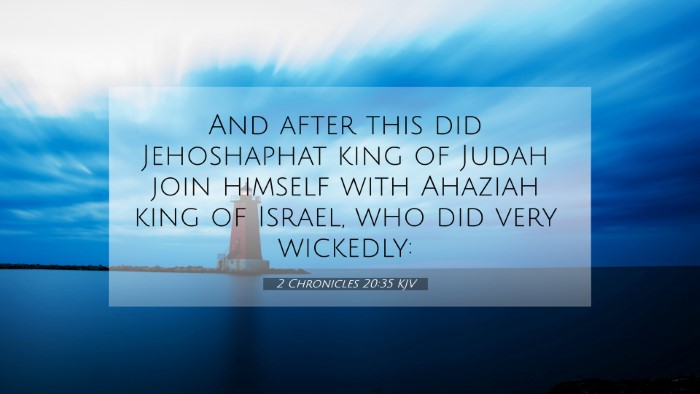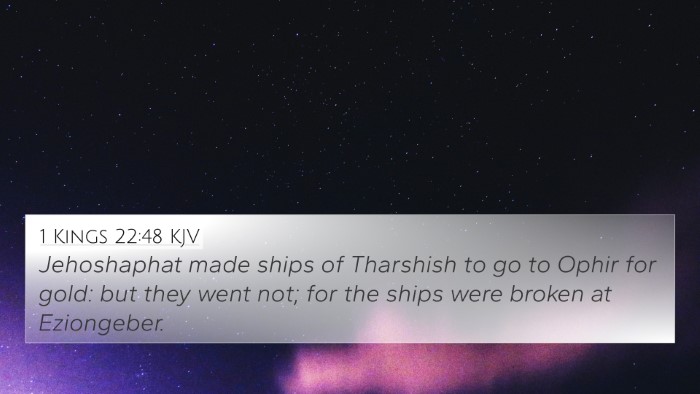Understanding 2 Chronicles 20:35
2 Chronicles 20:35 states, “And after this did Jehoshaphat king of Judah join himself with Ahaziah king of Israel, who did very wickedly.” This verse marks a significant moment in the reign of King Jehoshaphat of Judah, particularly highlighting his alliance with Ahaziah, the king of Israel. Below, we explore the combined insights from renowned public domain commentaries to provide a comprehensive understanding of this verse.
Background Context
This verse occurs in the context of King Jehoshaphat’s reign, a time when the kingdom of Judah faced numerous challenges. Jehoshaphat is often noted for his commitment to God and efforts to lead the people of Judah away from idolatry. His alliance with Ahaziah raises significant concerns about the implications of forming relationships with those who do not share the same faith or moral principles.
Insights from Commentaries
- Matthew Henry: Henry emphasizes the precarious nature of Jehoshaphat's alliance with Ahaziah. He notes that it was not typical for Jehoshaphat, who had previously demonstrated faithfulness to God, to engage with someone described as wicked. This alliance brings to light the risks of compromising faith for political gain, suggesting that such actions lead to eventual downfall, which Jehoshaphat would later face.
- Albert Barnes: Barnes points out that this partnership represents a departure from the piety that characterized Jehoshaphat’s earlier reign. He highlights that Ahaziah was known for his idolatrous practices, particularly in the worship of Baal, and aligning with him could endanger Judah's spiritual integrity. The commentary warns readers about the dangers of forming alliances with those who live contrary to God's commandments.
- Adam Clarke: According to Clarke, the text suggests that Jehoshaphat’s decision may have been influenced by political motives, particularly concerning trade and military alliances. Clarke highlights that while such alliances might offer temporary benefits, they can lead to long-term consequences that undermine one's spiritual standing before God. He suggests this verse serves as a cautionary tale against compromising one's faith for worldly alliances.
Thematic Connections
This verse opens up themes of political alliances and spiritual integrity. The decision of a godly king to align with a wicked king raises essential questions regarding the relationships believers form with those outside faith. It calls for reflection on how associations can impact the faith journey.
Bible Verse Cross-References
To enrich the understanding of 2 Chronicles 20:35, here are some significant Bible cross-references:
- 1 Kings 22:48-49: Discusses Jehoshaphat's ships that were destroyed, indicating the challenges faced in dealings with Israel.
- 2 Chronicles 19:2: Highlights the admonishment given to Jehoshaphat for assisting the wicked, emphasizing the consequences of his actions.
- Proverbs 13:20: Reinforces the wisdom of choosing friends wisely, as “he who walks with wise men will be wise, but the companion of fools will be destroyed.”
- Amos 3:3: Asks the rhetorical question about the ability to walk together unless they are agreed, highlighting the importance of shared values in partnerships.
- 2 Chronicles 21:6: Details the eventual outcome of Ahaziah’s lineage, showing the long-term consequences of such alliances.
- Deuteronomy 7:2-4: Advises against forming covenants with nations that worship other deities, illustrating the divine wisdom behind separation.
- 1 Corinthians 15:33: Warns that “bad company corrupts good morals,” echoing the core warning about alliances with the wicked.
Lessons and Applications
Reflecting on 2 Chronicles 20:35 invites several pivotal questions and lessons:
- How can believers navigate the complexities of relationships with those who may not share their faith?
- In what ways can we ensure that our spiritual integrity remains intact amidst alliances or partnerships?
- What are the long-term consequences of compromising one’s faith for the sake of political or personal gain?
Conclusion
In conclusion, 2 Chronicles 20:35 serves as a poignant reminder of the potential dangers associated with unwise alliances, particularly between believers and those who practice wickedness. The insights from public domain commentaries enrich our understanding of this verse, guiding individuals in their walk of faith and relationships. This passage, along with its associated cross-references, encourages continuous reflection on maintaining spiritual integrity while navigating the complexities of human relationships.




